Hello everybody and welcome to another dev diary for the upcoming Barbarossa patch and yet to be announced DLC. Today I’m going to be talking about the first focus tree which is a rework of Poland.
Poland was first added as a free DLC on release for everyone titled "United and Ready" so as such what you see in this diary will be free for everyone once Barbarossa drops. Next diary we will continue on to cover the DLC parts of the focus tree, because the tree is a bit too large to cover in one go. Enjoy!
Poland is interesting because it is a hugely popular minor (it's roughly as popular as Spain and more popular than Greece). Yet it has a very difficult position sandwiched between Soviet and Germany, which tend to scare people off. Perhaps it's the challenge, or its critical role in WW2, or just the large amount of Polish HOI4 fans, you tell me.
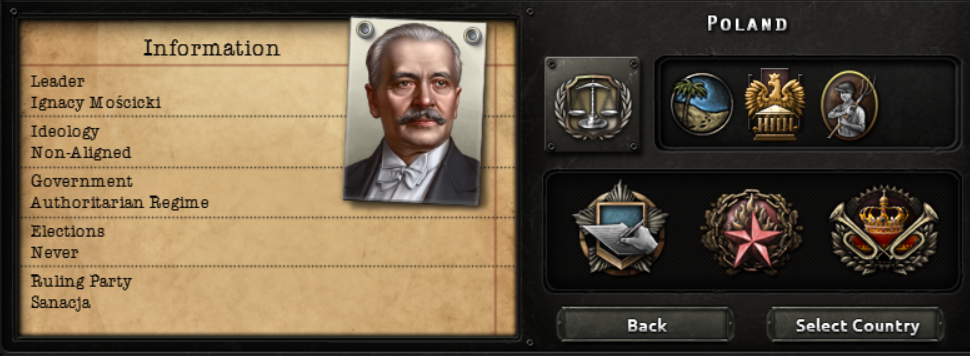
So, if we load up the tree we can see not only Ignacy Mościcki’s beautiful new portrait, but an entirely new tree.

Let’s start with the industrial branch. In the old tree, the player would have to dredge through a lot of low-value research bonuses to get just a few extra factories, so many of those old focuses have been expanded with extra factories and bonuses. But, this branch is not just about getting free factories, Poland is on a tight schedule and must use her time well if she has ambitions of outlasting the Reich.

Many industry focuses for Poland grant powerful but temporary bonuses towards consumer goods and construction speed so time the funding of your armement well to maximize the bonuses you’ll get.

Poland was a nation with many problems in 1936, and one such problem was that their rail networks were disparate and disconnected; largely due to the fact that Poland had only a few decades prior been part of three different nations. Among many problems this caused for Poland, it also disrupted their agricultural supply networks, which resulted in the Peasant’s Strike of 1937.
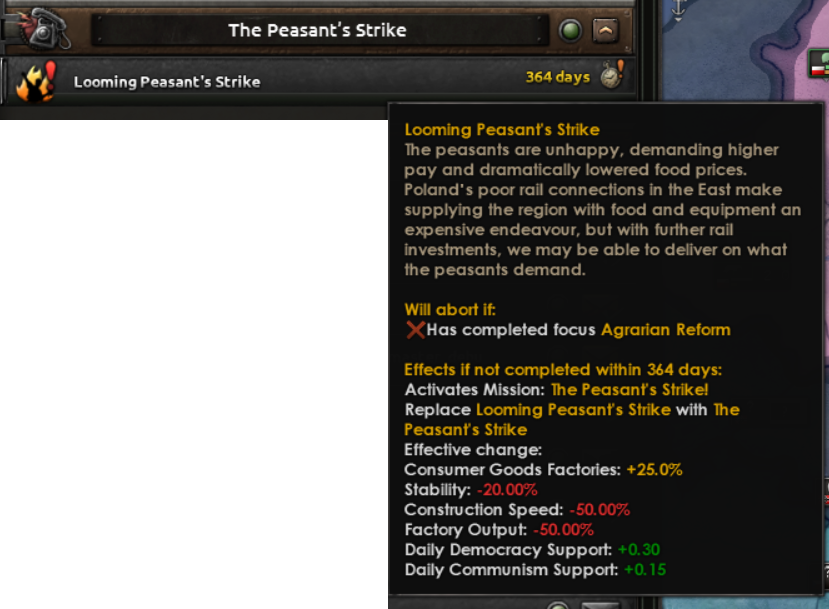
Beginning as mere whispers among the peasantry, if Poland fails to join the supply networks and enact major agricultural reform, they will be faced with a nasty peasant’s strike, damaging their stability, industry, and populace. Though on a tight schedule, Poland may pacify the countryside to delay this uprising, but until reform is enacted, the peasants will remain restless.
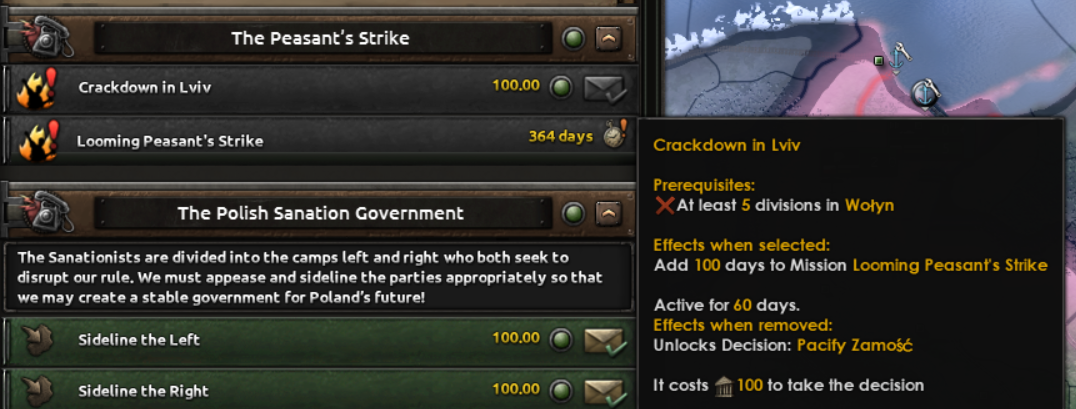
Failing to enact reform entirely will result in a massive populist uprising, and a civil war is the last thing Poland needs. If Poland is to survive the Reich and the USSR, she must be united and ready.

Moving on to another issue Poland had in the 30s; we have the Free City of Danzig! Danzig/Gdansk was in a unique and complicated position in this period. The city was simultaneously free and owned by no-one, an official Polish protectorate, and an international city partially run by the League of Nations. So representing Danzig/Gdansk as an on-map tag in 36 felt not quite right, so instead the city is demilitarized and Poland is incapable of accessing any of their factories, resources, or manpower.

When the Nazi party took power in the city, it strangled Polish trade, so Poland begins the game with the “Embargoed Economy” trade law, similar to Undisturbed Isolation in the US but not nearly as harsh. To remove the Embargoed Economy, Poland must either develop a new trade port in Gdynia, gain a new port through conquest, or clamp down on Danzig.
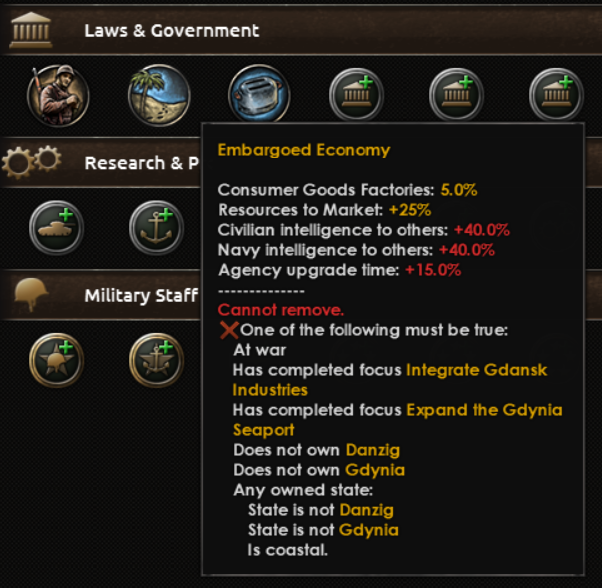

Attempting to seize control of Danzig will cause the city to begin a resistance, and Poland can fight that resistance through decisions and the usual resistance/compliance mechanics. With enough compliance, Poland will be able to ban the Nazi party and take permanent control of the city; ending the resistance, gaining access to all of Danzig’s resources, manpower, and industry, and finally being able to remove the embargoed economy.
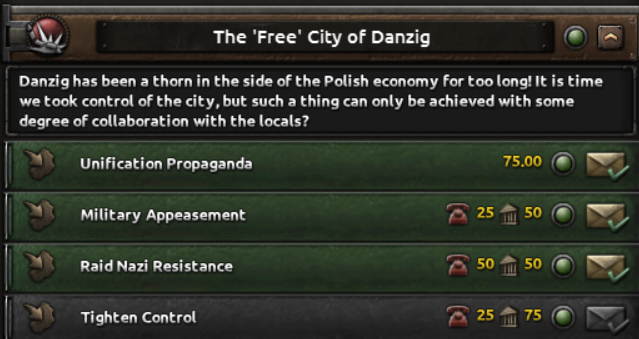
Failing to bring Danzig under control will result in the city rising up against you and appearing as a tag on the map. Failing to stamp out this uprising in time will cause the city to defect to the Reich.

When either Gdynia or Danzig has become Poland’s major port, they gain access to the rest of their naval branch, granting dockyards, factories, and research bonuses.
Next up we have the old Prepare for the Next War branch, which has been expanded quite considerably since its original implementation. Poland now has access to Plan East and Plan West, military plans to fight the USSR and the Reich.
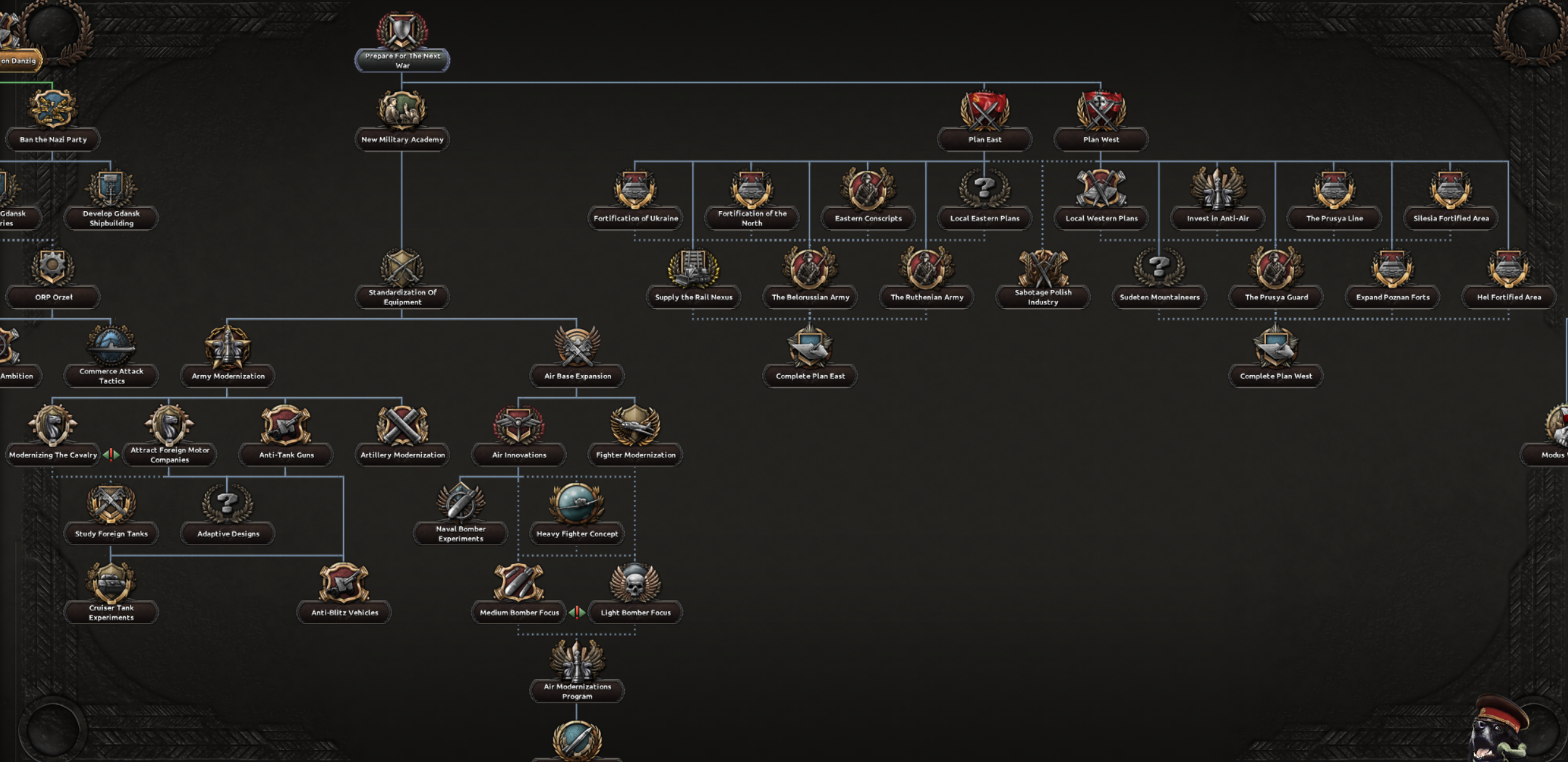
Historically, Poland believed the USSR to be the greater threat and didn’t begin preparing Plan West until just two years before invasion. But, with the power of hindsight, the player can start either plan immediately after completing the Prepare for the Next War focus, and accumulate forts and construction bonuses along the border.
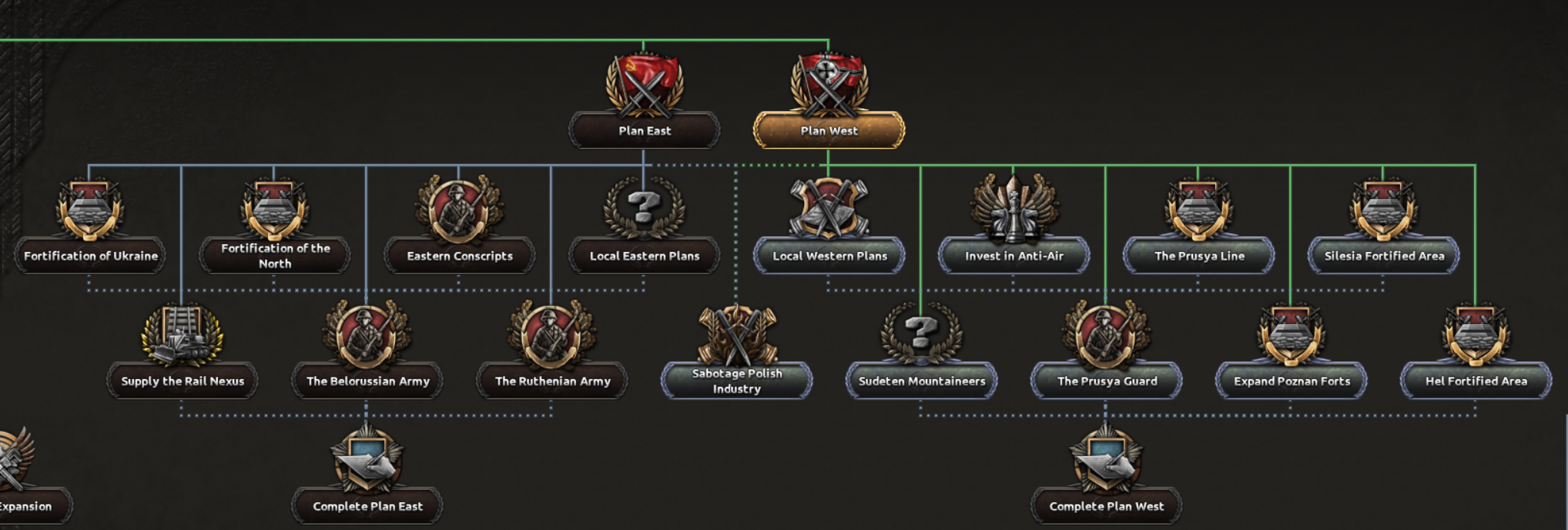
However, until Plan West has been completed, Plan East cannot be begun and vice versa, but when complete, no further focuses from the branch may be taken.
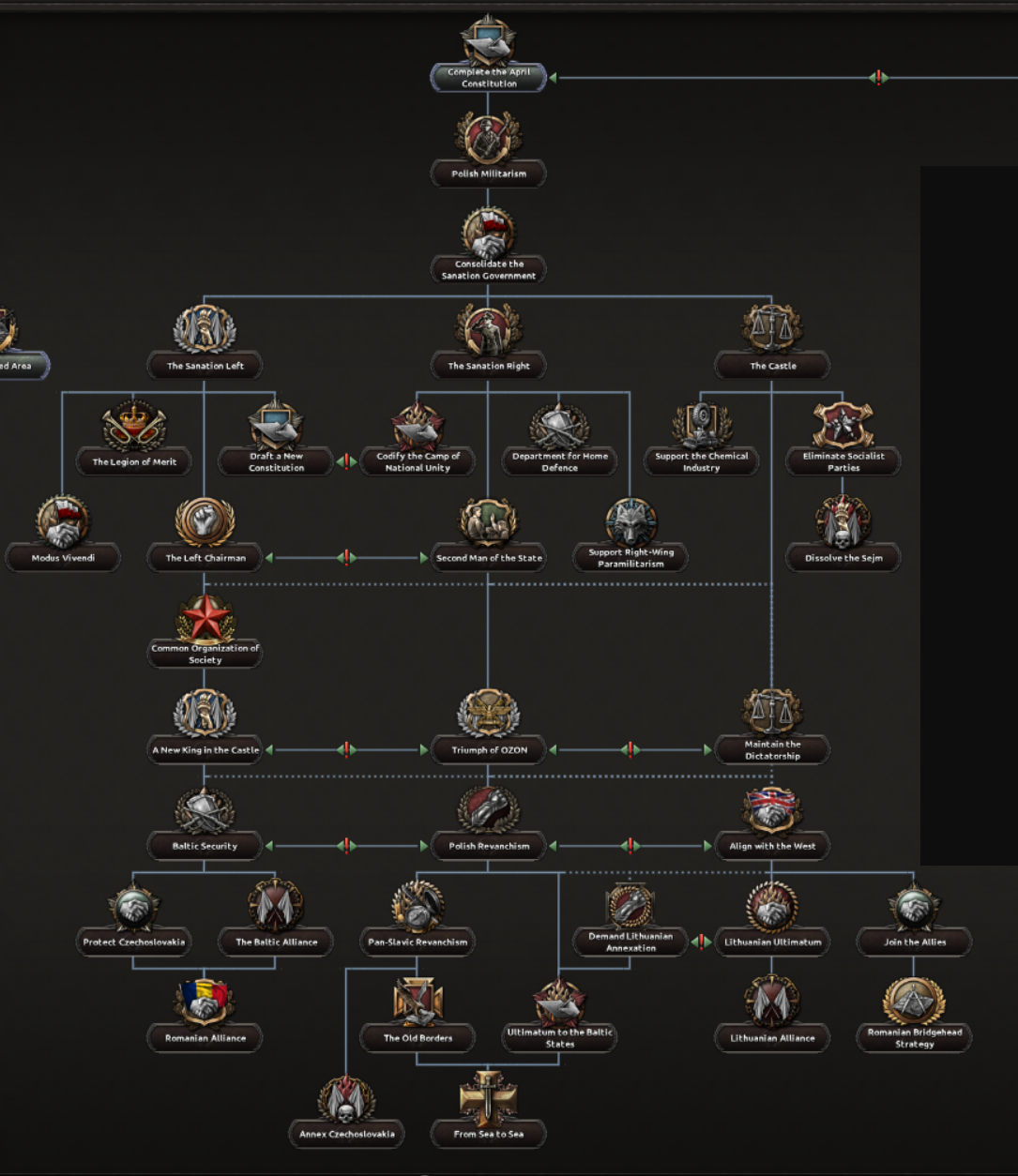
Finally, probably the part of the tree that has received the most love; the historical Polish political focus branch. Poland was not the united stable regime we had previously seen on release. Along with impending threats outside their borders, Poland was (like most authoritarian regimes) plagued with infighting and factionalism.
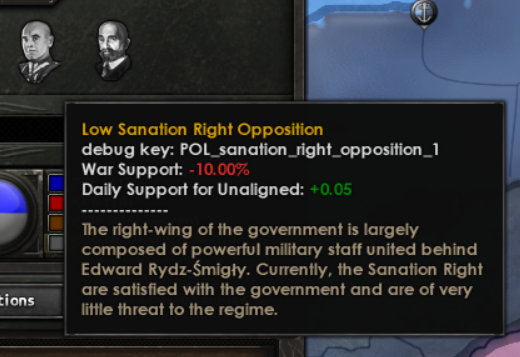
The dictatorship was divided between the Castle lead by Ignacy Mościcki, the Sanation Right lead by Edward Rydz-Śmigły, and the Sanation Left led by Walery Sławek.

Each branch of the Sanation has a series of focuses that can be completed for various bonuses and the player does not have to commit to one faction or the other right away. Rather, you can form your government with a multitude of policies from each of the three factions, but the longer you spend forming your government, the less time you have for other things like industry and plans East and West.

Historical Poland will also have access to the April Constitution, the binding document of the Dictatorship. Though it begins weak, through collaboration with Sanations Left and Right, the Constitution will become a powerful bonus to Poland's politics. With all power consolidated in the President, you'll be able to change your laws and your cabinet with ease.

Time isn’t your only opponent here though, each of the two factions will expect Mościcki to appease them by enacting their policies and giving them power. Every focus of the Left you complete will make the Right more irritated and vice versa. On top of that, both factions will passively gain irritation over time so spend too long without taking a side and you risk losing both to civil wars.
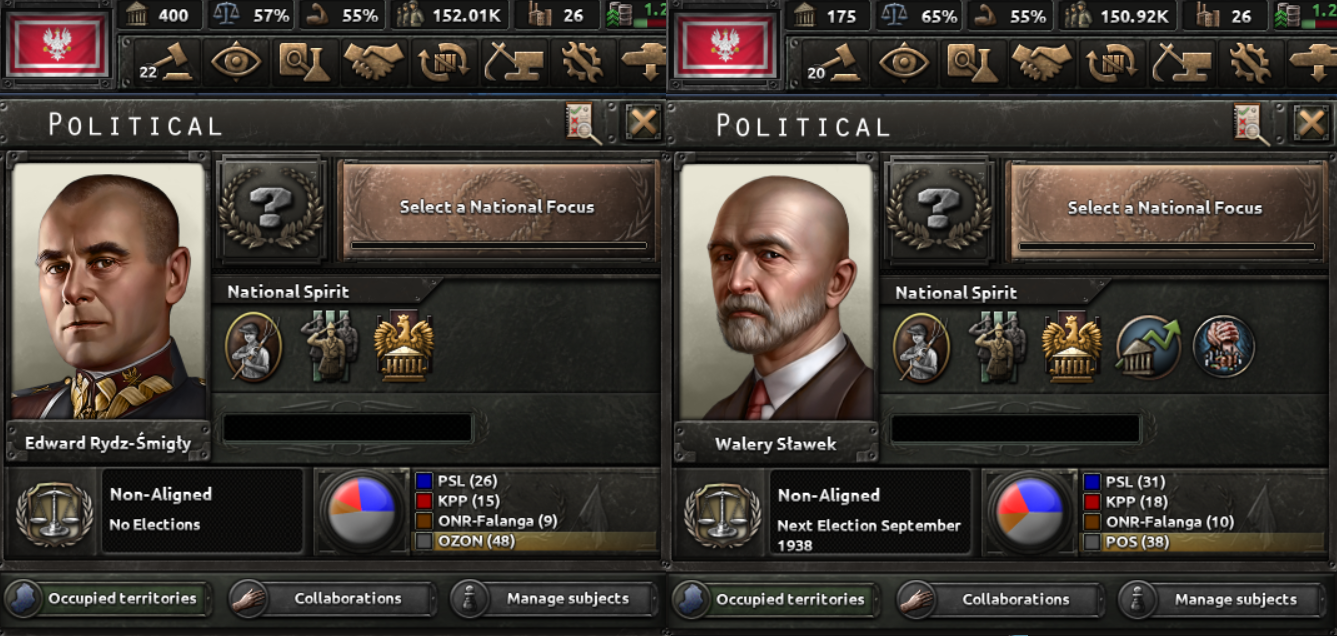
Historically, Mościcki maintained control of the government until wartime, at which point it was agreed Śmigły would take control, but Poland failed to last long enough for this to take effect. However, if the player has appointed either Śmigły or Sławek as Chairman of Poland, the Sanation Right/Left can supercede the Castle and become the majority controller of the government. This enables some light alt-history within the historical branch, as well as unlocking new diplomatic options for Poland.

Available to all three factions of the dictatorship is the Align With the West branch, which allows Poland to join the Allies as they were able to in their old tree.

In the 30s, Lithuania was technically at war with Poland until the 1938 Polish ultimatum to Lithuania in which Poland demanded an end to the cold war over Vilnius. As well as being able to gain cooperation and eventually an alliance with Lithuania, Poland may also demand Lithuania’s annexation which can result in occupying Lithuania without the need for war, but take this focus with caution as it extends your frontline with the Axis.

Lastly, the Romanian Bridgehead Strategy has now been moved to the diplomatic branch and allows Poland to bring Romania into the allies. Historically, Poland and Lithuania had an alliance prior to the war, and Poland can pursue this alliance closer, bringing Romanian guns to the Polish front.
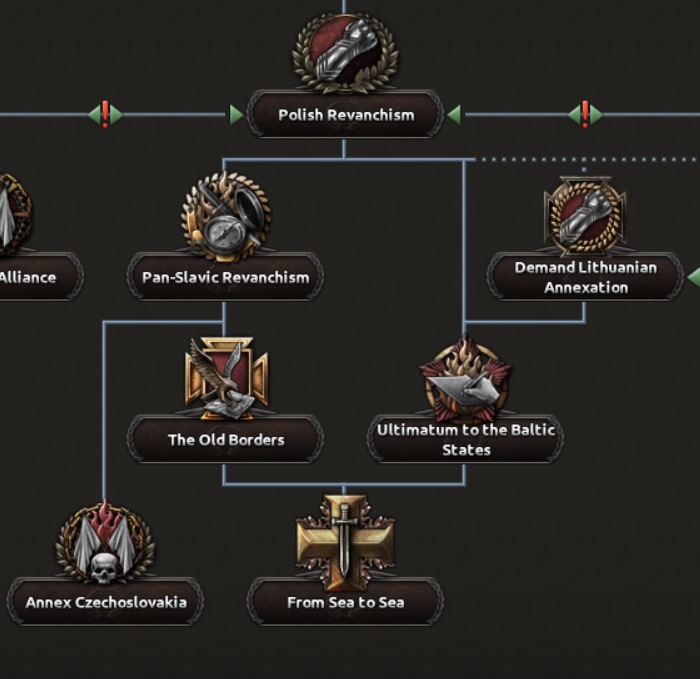
The Sanation Right exclusively has access to Polish Revanchism which has now been expanded into its own full branch. As well as being able to demand the annexation of Lithuania, the Right can pursue both a restored Commonwealth and fulfil the ambition of the Polish–Czechoslovak confederation.

Lastly, the Sanation Left has access to an expanded Baltic Alliance path, allowing them to gain alliances with the Baltic states, Czechoslovakia, and Romania, and unlocking the newly expanded Between the Seas branch!
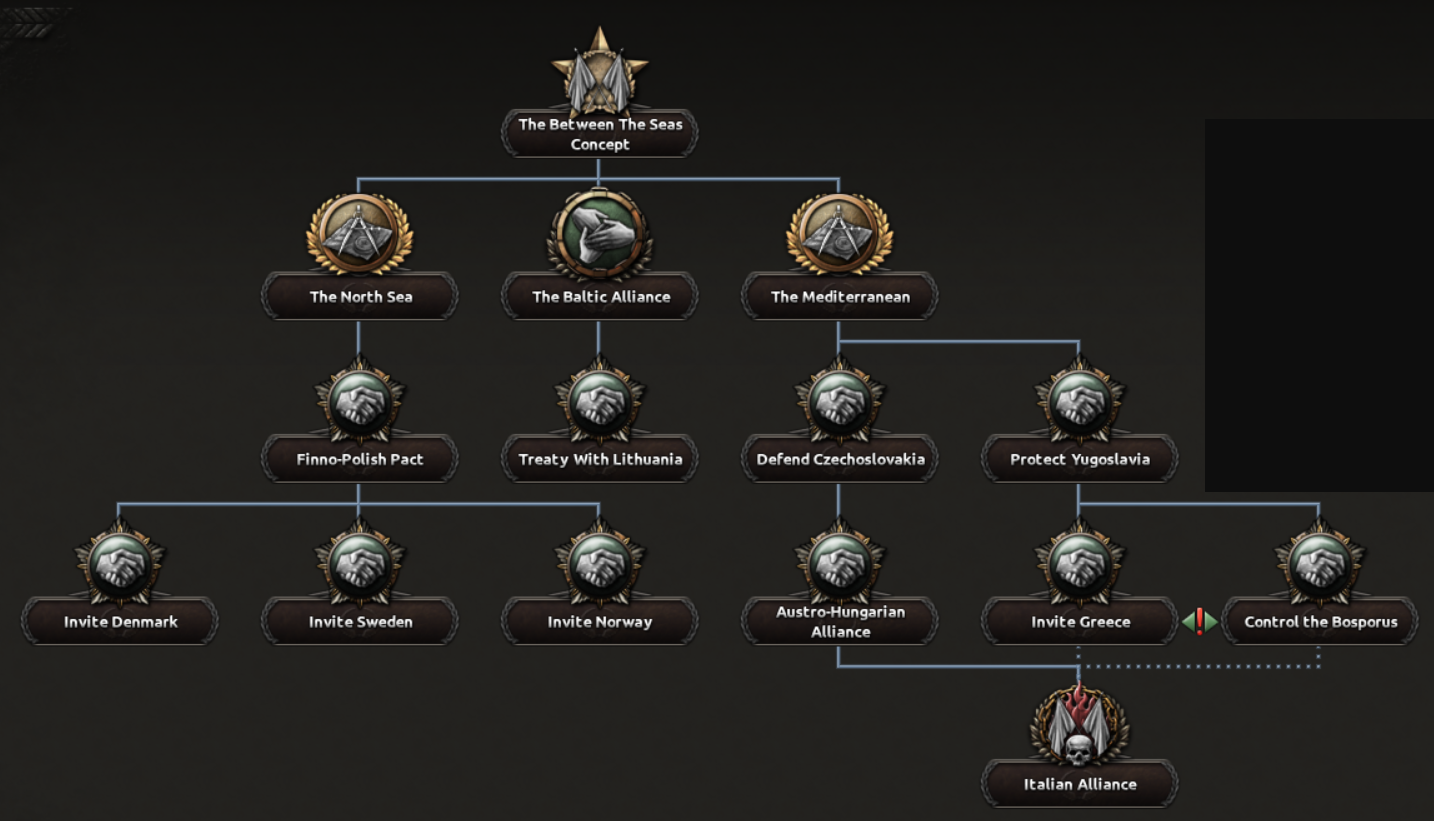
(It's worth mentioning at this point that most focus icons are placeholder)
No matter which path Poland is pursuing, as long as Poland is not in a faction already, they will be able to realize the Intermarium ambition and create an alliance from sea-to-sea! All they need to do is be considered a major or be a faction leader already, and have a large army. At this point, Poland can be considered a real contender for a major alliance of their own.

The old Between Seas focus was not really “between seas” so much as it was just a Baltic alliance, but now the first nation to be invited to the faction is Romania. After Romania has made their decision, the alliance can spread any direction; north into Scandinavia and the Baltics, and south into the Balkans. Though unlikely, an Italian alliance is not out of the question for Poland here, but some significant change in policy for either nation would be necessary to tempt the Italians away from the Axis.
That’s all for this one, next week we’ll be talking about Poland’s DLC-locked alternate history branches!
Poland was first added as a free DLC on release for everyone titled "United and Ready" so as such what you see in this diary will be free for everyone once Barbarossa drops. Next diary we will continue on to cover the DLC parts of the focus tree, because the tree is a bit too large to cover in one go. Enjoy!
Poland is interesting because it is a hugely popular minor (it's roughly as popular as Spain and more popular than Greece). Yet it has a very difficult position sandwiched between Soviet and Germany, which tend to scare people off. Perhaps it's the challenge, or its critical role in WW2, or just the large amount of Polish HOI4 fans, you tell me.

So, if we load up the tree we can see not only Ignacy Mościcki’s beautiful new portrait, but an entirely new tree.

Let’s start with the industrial branch. In the old tree, the player would have to dredge through a lot of low-value research bonuses to get just a few extra factories, so many of those old focuses have been expanded with extra factories and bonuses. But, this branch is not just about getting free factories, Poland is on a tight schedule and must use her time well if she has ambitions of outlasting the Reich.

Many industry focuses for Poland grant powerful but temporary bonuses towards consumer goods and construction speed so time the funding of your armement well to maximize the bonuses you’ll get.

Poland was a nation with many problems in 1936, and one such problem was that their rail networks were disparate and disconnected; largely due to the fact that Poland had only a few decades prior been part of three different nations. Among many problems this caused for Poland, it also disrupted their agricultural supply networks, which resulted in the Peasant’s Strike of 1937.

Beginning as mere whispers among the peasantry, if Poland fails to join the supply networks and enact major agricultural reform, they will be faced with a nasty peasant’s strike, damaging their stability, industry, and populace. Though on a tight schedule, Poland may pacify the countryside to delay this uprising, but until reform is enacted, the peasants will remain restless.

Failing to enact reform entirely will result in a massive populist uprising, and a civil war is the last thing Poland needs. If Poland is to survive the Reich and the USSR, she must be united and ready.

Moving on to another issue Poland had in the 30s; we have the Free City of Danzig! Danzig/Gdansk was in a unique and complicated position in this period. The city was simultaneously free and owned by no-one, an official Polish protectorate, and an international city partially run by the League of Nations. So representing Danzig/Gdansk as an on-map tag in 36 felt not quite right, so instead the city is demilitarized and Poland is incapable of accessing any of their factories, resources, or manpower.

When the Nazi party took power in the city, it strangled Polish trade, so Poland begins the game with the “Embargoed Economy” trade law, similar to Undisturbed Isolation in the US but not nearly as harsh. To remove the Embargoed Economy, Poland must either develop a new trade port in Gdynia, gain a new port through conquest, or clamp down on Danzig.


Attempting to seize control of Danzig will cause the city to begin a resistance, and Poland can fight that resistance through decisions and the usual resistance/compliance mechanics. With enough compliance, Poland will be able to ban the Nazi party and take permanent control of the city; ending the resistance, gaining access to all of Danzig’s resources, manpower, and industry, and finally being able to remove the embargoed economy.

Failing to bring Danzig under control will result in the city rising up against you and appearing as a tag on the map. Failing to stamp out this uprising in time will cause the city to defect to the Reich.

When either Gdynia or Danzig has become Poland’s major port, they gain access to the rest of their naval branch, granting dockyards, factories, and research bonuses.
Next up we have the old Prepare for the Next War branch, which has been expanded quite considerably since its original implementation. Poland now has access to Plan East and Plan West, military plans to fight the USSR and the Reich.

Historically, Poland believed the USSR to be the greater threat and didn’t begin preparing Plan West until just two years before invasion. But, with the power of hindsight, the player can start either plan immediately after completing the Prepare for the Next War focus, and accumulate forts and construction bonuses along the border.

However, until Plan West has been completed, Plan East cannot be begun and vice versa, but when complete, no further focuses from the branch may be taken.

Finally, probably the part of the tree that has received the most love; the historical Polish political focus branch. Poland was not the united stable regime we had previously seen on release. Along with impending threats outside their borders, Poland was (like most authoritarian regimes) plagued with infighting and factionalism.

The dictatorship was divided between the Castle lead by Ignacy Mościcki, the Sanation Right lead by Edward Rydz-Śmigły, and the Sanation Left led by Walery Sławek.

Each branch of the Sanation has a series of focuses that can be completed for various bonuses and the player does not have to commit to one faction or the other right away. Rather, you can form your government with a multitude of policies from each of the three factions, but the longer you spend forming your government, the less time you have for other things like industry and plans East and West.

Historical Poland will also have access to the April Constitution, the binding document of the Dictatorship. Though it begins weak, through collaboration with Sanations Left and Right, the Constitution will become a powerful bonus to Poland's politics. With all power consolidated in the President, you'll be able to change your laws and your cabinet with ease.

Time isn’t your only opponent here though, each of the two factions will expect Mościcki to appease them by enacting their policies and giving them power. Every focus of the Left you complete will make the Right more irritated and vice versa. On top of that, both factions will passively gain irritation over time so spend too long without taking a side and you risk losing both to civil wars.

Historically, Mościcki maintained control of the government until wartime, at which point it was agreed Śmigły would take control, but Poland failed to last long enough for this to take effect. However, if the player has appointed either Śmigły or Sławek as Chairman of Poland, the Sanation Right/Left can supercede the Castle and become the majority controller of the government. This enables some light alt-history within the historical branch, as well as unlocking new diplomatic options for Poland.

Available to all three factions of the dictatorship is the Align With the West branch, which allows Poland to join the Allies as they were able to in their old tree.

In the 30s, Lithuania was technically at war with Poland until the 1938 Polish ultimatum to Lithuania in which Poland demanded an end to the cold war over Vilnius. As well as being able to gain cooperation and eventually an alliance with Lithuania, Poland may also demand Lithuania’s annexation which can result in occupying Lithuania without the need for war, but take this focus with caution as it extends your frontline with the Axis.

Lastly, the Romanian Bridgehead Strategy has now been moved to the diplomatic branch and allows Poland to bring Romania into the allies. Historically, Poland and Lithuania had an alliance prior to the war, and Poland can pursue this alliance closer, bringing Romanian guns to the Polish front.

The Sanation Right exclusively has access to Polish Revanchism which has now been expanded into its own full branch. As well as being able to demand the annexation of Lithuania, the Right can pursue both a restored Commonwealth and fulfil the ambition of the Polish–Czechoslovak confederation.

Lastly, the Sanation Left has access to an expanded Baltic Alliance path, allowing them to gain alliances with the Baltic states, Czechoslovakia, and Romania, and unlocking the newly expanded Between the Seas branch!

(It's worth mentioning at this point that most focus icons are placeholder)
No matter which path Poland is pursuing, as long as Poland is not in a faction already, they will be able to realize the Intermarium ambition and create an alliance from sea-to-sea! All they need to do is be considered a major or be a faction leader already, and have a large army. At this point, Poland can be considered a real contender for a major alliance of their own.

The old Between Seas focus was not really “between seas” so much as it was just a Baltic alliance, but now the first nation to be invited to the faction is Romania. After Romania has made their decision, the alliance can spread any direction; north into Scandinavia and the Baltics, and south into the Balkans. Though unlikely, an Italian alliance is not out of the question for Poland here, but some significant change in policy for either nation would be necessary to tempt the Italians away from the Axis.
That’s all for this one, next week we’ll be talking about Poland’s DLC-locked alternate history branches!



